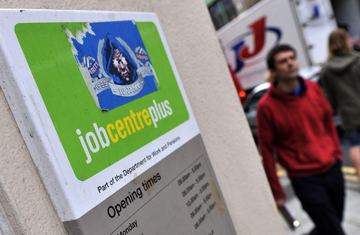
A pedestrian passes an office of the government employment agency Jobcentre Plus in London on Oct. 12, 2011. It is estimated that 1 in 5 British young people ages 18 to 25 years old are out of work
In the summer of 2011, the world saw two very different sides of Britain: the fairy-tale romance of a royal wedding, and the uncorked rage of rioters setting London ablaze as they ransacked cities across the country. And while the traditional, picture-perfect image of Britain continues to draw the international spotlight, the situation far from the charmed circle is only getting worse. Youth unemployment in the country is at its highest level since current records began in the early 1990s. Almost 1 million (1 in 5) of 18- to 24-year-olds are out of work, and many of them have been for a long time: the number of young people who have not had a job for two years increased 43% this year.
Countries across Europe are suffering similarly devastating levels of youth unemployment, but in Britain, the issue has particular urgency. Studies show that no European country's young people are as prone to drink, drugs and crime as Britain's, and no country has experienced the same violent rioting that swept England in August. Government figures released on Monday show that those who took part in the riots were poorer, younger and less educated than average. Some 90% were male; half were under age 20. Over a third were on unemployment benefits, while three-quarters have prior convictions and two-thirds have special-education needs. With jobs and opportunities closing down around them, what does the future hold for Britain's alienated youth?
Gary Kelling, a shy, stooping 21-year-old in a purple striped hoodie, lives in a social housing block north of London, just outside Tottenham, the epicenter of the August riots. He spends much of his time with his friends engaging in the urban acrobatics of parkour, or free running. Kelling's single father has Parkinson's, and he and his younger brother survive by "signing on" — collecting $86 in Jobseeker's Allowance from the government each week. Kelling says he wants to "earn a lot of money" but predicts that in a year's time, he'll still be hanging around Block 55.
Kelling, like many other NEETs (the government's acronym for those "not in education, employment or training"), isn't even looking for work. For him, signing on is a way of life. Paul Brown of the British youth charity Prince's Trust says Kelling's story is a common one: "We make contact literally every day with young people who think they'll never work."
In fact, not one of Kelling's free-running companions — a group of seven boys ages 13 to 21 — has a job. Those who don't get their money from the government steal and deal drugs. Adrian Smith, a boyish 19-year-old who emigrated from Poland five years ago, is expert at finding such alternative sources of income. Smith completed a three-year bricklaying course after leaving school at 16, but found he could make more stealing BlackBerries. "I don't want the government's money," he explains as his slender younger brother, also a free runner, rolls a joint.
For now, Kelling and his friends still have one foot in boyhood. They play all afternoon, they're not in gangs. But they're vulnerable, and being jobless doesn't help. Unemployment robs individuals of "a positive identity — a status in modern societies," says Brendan Burchell, a lecturer in sociology at the University of Cambridge. A recent UNICEF study found that in the U.K. "status brands tended to be more important to children from less affluent backgrounds, presumably as a means of masking financial and social insecurities and bolstering self-esteem." This may explain why young rioters left a trail of empty Nike shoeboxes and designer-clothes hangers in their wake.
